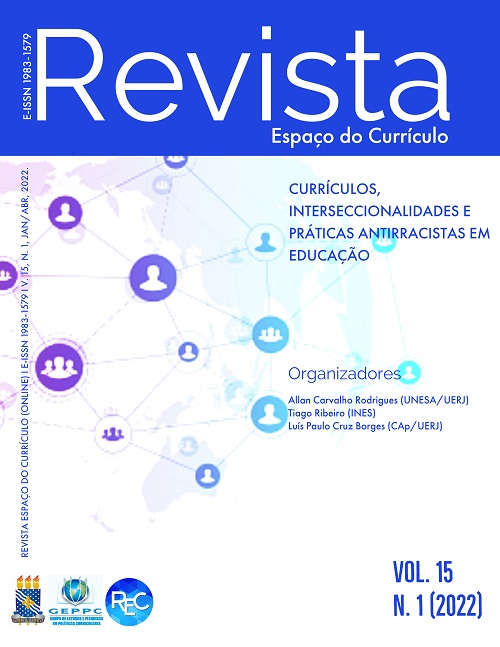CURRICULUM, CULTURE AND ANCESTRALITY
the Africanidades Project as an enunciative present
DOI:
https://doi.org/10.15687/rec.v15i1.62867Keywords:
Curriculum, Culture, Black Ancestry, Cultural EnunciationAbstract
Law 10.639/2003 brought new perspectives on black culture and ancestry to the field of curriculum, by questioning monoculturalism in curricula and by claiming multicultural curriculum productions. However, when highlighting a black ancestor, legislation, such as the Minimum Curriculum of the State of Rio de Janeiro, represents a temporality as an epistemological object and identity of a specific language. A movement that delimits and restricts experiences and conceptions of blackness today, outlining a static, occlusive and unique black ancestry. Thus, this article analyzes, through the notion of curriculum as cultural enunciation, Bhabha (2014) and Macedo (2006a), how the Africanidades Project, at Ciep Carolina Maria de Jesus, reenacts motivation for the aforementioned legislation, in its curricular production the black ancestry, introducing other cultural temporalities. Questioning the caricatural and stereotyped representations of black people, crystallized in the curricular texts, the starting point is the following problem: how does the Africanidades Project work with black ancestry in the performance of its curricular production? Through interviews, field journal and mainly participatory observation, it is analyzed and highlighted that Africanidades works with the temporality of legislation, combined with other performative temporalities, reshaping the conceptualization of black ancestry and curriculum in the performance of its curricular production, re-elaborating them. moved, contingent and plural.
Downloads
Metrics
References
ALMEIDA, Silvio Luiz de. Racismo estrutural. São Paulo, Pólen, 2019.
ALMEIDA, Marco. SANCHEZ, Lívia. Os negros na legislação educacional e educação formal no Brasil. Revista Eletrônica de Educação, v. 10, n. 2, p. 234-246, 2016.
BHABHA, Homi. O local da cultura. Belo Horizonte: UFMG, 2014.
BARRETO, Raquel. Uma pensadora brasileira. Revista Cult, 2019. Disponível em: https://revistacult.uol.com.br/home/lelia-gonzalez-perfil/. Acesso em: Mai. de 2020.
BRASIL. Lei n.o 10.639, de 9 de janeiro de 2003. Altera a Lei no 9.394, de 20 de dezembro de 1996, que estabelece as diretrizes e bases da educação nacional, para incluir no currículo oficial da Rede de Ensino a obrigatoriedade da temática "História e Cultura Afro-Brasileira", e dá outras providências. Diário Oficial da União, Brasília, DF, 10 jan. 2003a, p. 01. Disponível em http://www.planalto.gov.br/ccivil_03/Leis/2003/L10.639.htm. Acesso em: 20 abr. 2022.
DERRIDA, Jaques. Margens da filosofia. Trad. de Joaquim Torres Costa e Antônio M. Magalhães. São Paulo: Papirus, 1991.
DERRIDA, Jaques. Posições. Belo Horizonte: Autêntica, 2001.
DERRIDA, Jaques. Expectros de Marx. Rio de Janeiro: Relume-Dumará, 1994.
DUARTE, Eduardo de Assis. O negro na literatura brasileira. Navegações, v. 6, n. 2, p. 146-153, jul./dez. 2013.
EAGLETON, Terry. Teoria da literatura. São Paulo, Martins Fontes, 2006.
FIORIN, José Luiz. As astúcias da enunciação. São Paulo: Ática, 1996.
FISCHER, Rosa Maria Bueno. Adolescência em discurso – mídia e produção de subjetividade. 1996. 297 f. Tese (Doutorado em Educação) – Universidade Federal do Rio Grande do Sul, 1996.
FOUCAULT, Michel. A Arqueologia do saber. Rio de Janeiro: Forense, 1986.
GILROY, Paul. O Atlântico negro. Rio de Janeiro: Editora 34, 2001.
GOMES, Nilma Lino. O Movimento negro educador: saberes construídos nas lutas por emancipação. Petrópolis: Vozes, 2017.
GOMES, Nilma Lino. A compreensão da tensão regulação/emancipação do corpo e da corporeidade negra na reinvenção da resistência democrática. Revista Perseu, v.12, n. 17, p. 123-142, 2019.
GONDRA, José, SCHUELER, Alessandra. Educação, poder e sociedade no Império brasileiro. Rio de Janeiro: Cortez, 2008.
HALL, Stuart. A centralidade da cultura: notas sobre as revoluções culturais do nosso tempo. Educação e Realidade, Porto Alegre, n. 2, v. 22, p .5, 1997.
HAMPÂTÉ BÂ. “A tradição viva”. In: Ki-Zerbo, J. (Org.) História geral da África. Tradução de Beatriz Turquetti et al. Paris: UNESCO; São Paulo: Ática, 1982. p. 181-218.
LOPES, Alice Cassimiro. MACEDO, Elizabeth. Teorias de Currículo. Rio de Janeiro: Cortez, 2011.
MACEDO, Elizabeth. Currículo, cultura e diferença. In: Alicia de Alba; Alice Casimiro Lopes. (Org.). Diálogos curriculares entre Brasil e México. Rio de Janeiro: EDUERJ, 2014.
MACEDO, Elizabeth. Currículo como espaço-tempo de fronteira cultural. Revista Brasileira de Educação v. 11 n. 32 maio/ago. 2006a. Disponível em: https://doi.org/10.1590/S1413-24782006000200007. Acessado em: 23 de Out. de 2020.
MACEDO, Elizabeth. Por uma política da diferença. Cadernos de pesquisa, v. 36, n.128, p. 327-356, mai/ago. 2006b. Disponível em: https://www.scielo.br/scielo.php?pid=S0100- 15742006000200004&script=sci_abstract&tlng=pt. Acessado em: 22 de nove. de 2020.
MBEMBE, Achille. Por que julgamos que a diferença seja um problema? 2016. Disponível em: https://www.goethe.de/ins/br/pt/m/kul/sup/eps/20885952.html. Acesso em: 20 de nove. de 2020.
MUNANGA, Kabengele. As ambiguidades do racismo à brasileira. In: KON, Noemi Moritz; SILVA, Maria Lúcia da; ABUD, Cristiane Curi (Orgs.). O racismo e o negro no Brasil: questões para a psicanálise. 1ª ed. São Paulo: Perspectiva, 2017.
PEREIRA, Amauri Mendes. Do Movimento Negro À Cultura de Consciência Negra. Rio de Janeiro: Nandyala, 2007.
PETTER, Margarida. Por que estudar línguas africanas no Brasil? Extraprensa, São Paulo, v. 11, n. 2, p. 197 – 210, jan./jun. 2018.
RIO DE JANEIRO (cidade). Governo do Estado do Rio de Janeiro. Secretaria de Estado de Educação. Currículo mínimo – confira orientações. Rio de Janeiro: Secretaria de Estado de Educação, 2012. Disponível em: https://seeduconline.educa.rj.gov.br/curr%C3%ADculo-b%C3%A1sico . Acesso em: 22 mai. 2021.
SEGATO, Rita Laura. Raça é signo. Brasília: in Série Antropologia, n. 372, 2005.
SOUZA, Lynn Mario T. Menezes de. Hibridismo e tradução cultural em Bhabha. In: ABDALA JÚNIOR, Benjamin (org). Margens da cultura: mestiçagem, hibridismo & outras misturas. São Paulo: Boitempo Editorial, 2004. P. 113-133.
Downloads
Published
How to Cite
Issue
Section
License
Copyright (c) 2022 Curriculum Space Journal

This work is licensed under a Creative Commons Attribution 4.0 International License.
By submitting an article to Curriculum Space Journal (CSJ) and having it approved, the authors agree to assign, without remuneration, the following rights to Curriculum Space Journal: first publication rights and permission for CSJ to redistribute this article. article and its metadata to the indexing and reference services that its editors deem appropriate.
















